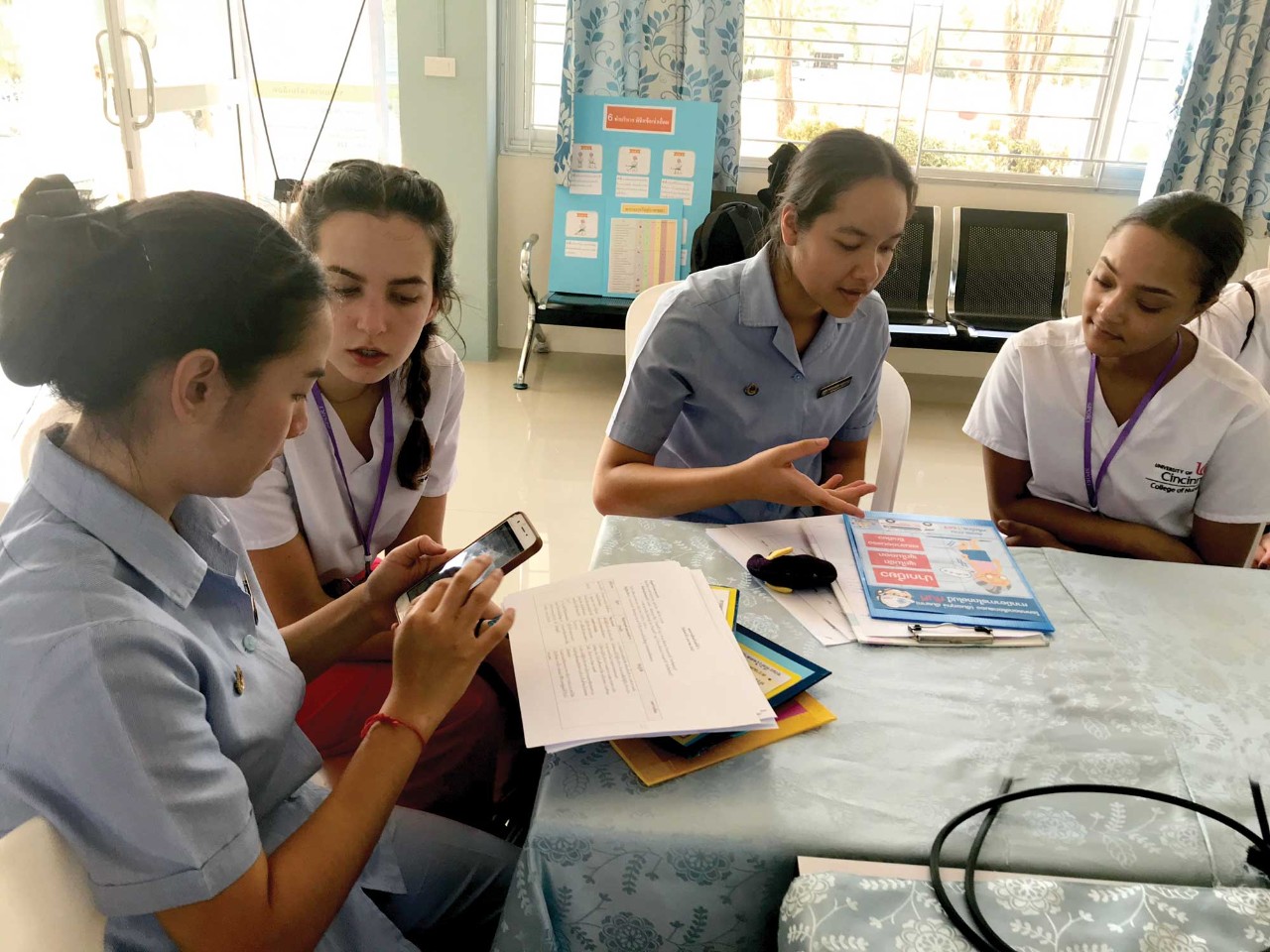
Immersive Learning
Global programs equip nursing students with cultural humility and empathy

Kate York, PhD
By: Katie Coburn
University of Cincinnati College of Nursing's Director of Global Health Nursing, Kate York, PhD, was hired in 2016 to implement Dean Greer Glazer’s vision to expand and strengthen global experiences for all students as one of the strategies to achieve its goal to “eliminate health care disparities in our community (local to global).”
That was a welcome challenge to York, whose interest in global health started developing during her doctoral studies, when she led research in Tanzania. A few years later, the opportunity to give back to the country arose through a fellowship in Global Clinical Education – part of a partnership between the Global Health Service, Seed Global Health, U.S. Peace Corps and the President’s Emergency Plan for AIDS Relief – and York spent a year teaching nursing students at Hubert Kairuki Memorial University (HKMU) in Dar es Salaam, Tanzania.
These experiences shaped York’s philosophy of global study abroad for nursing students as one that requires immersive interaction with student nurses and nurses in host countries in a meaningful and sustainable way. To that end, the UC College of Nursing has worked for the past few years to expand its global student experiences by creating academic partnerships with schools and colleges of nursing around the world and sustaining these relationships through mutually beneficial activities. These include relationships with nursing faculty in Thailand and Tanzania, and collaboration with Cincinnati-based nonprofit Village Life Outreach Project, which leads medical missions overseas.
“Students who participate in global immersion programs are more likely to have greater cultural humility, empathy and understanding of health care challenges for patients who do not speak English as a first language or are from other cultures,” says York.
Her connection to HKMU opened the door to an opportunity for UC nursing students, who can complete an immersive, two-week community clinical rotation alongside Tanzanian nursing students in a rural setting. In return, the college will support professional development of HKMU faculty.
Students who participate in global immersion programs are more likely ot have greater cultural humility, empathy and understanding of health care challenges.
Kate York, PhD Director of Global Health Nursing
It is an enriching experience for everyone involved, York says. “We’re not just going to another country and working outside of the health system. Our students actually live in the community with the Tanzanian students and work with them as part of the health system,” she says. “They’re exchanging cultural knowledge and creating what could be lifelong relationships with nurses in other countries.”
A similar experience allows students to complete clinical rotations alongside nursing students in Thailand through partnerships with the Boromarajonani College of Nursing at Phra-Phutthabat and at Saraburi. UC nursing students have also experienced clinical rotations in Japan, the Dominican Republic and India.
To provide broader access to these opportunities and increase the number of underrepresented students who can take advantage of these experiences, the college offers students financial aid opportunities, made possible with the support of generous donors and grant funding. In addition, a new grant secured by York and Angela Clark, PhD, assistant professor and executive director of undergraduate and pre-licensure programs, supports students who will have the opportunity to participate in a unique community clinical program that combines local experiences by mentoring high school students in Cincinnati Public Schools and global experiences through the HKMU partnership in Tanzania.
“We are glad to see our global program grow and become more robust every year. Our increasing ability to select and include underrepresented and diverse students in this competitive program is a special reward to our efforts,” Clark says.
This year, the coronavirus pandemic changed the course of many planned university experiences, including those at the UC College of Nursing. Trips planned for 2020 have been canceled, including what would have been the college’s first multidisciplinary trip to Costa Rica alongside students majoring in social work.
On the flip side, York used the pandemic to her students’ advantage and focused her Spring 2020 global health course on the coronavirus.
“We used COVID-19 as a case study throughout the semester, which really enriched learning and gave students a greater understanding of all the moving parts of global health,” York says. “They have a greater understanding of not just the implications of an infectious disease and what that means to your counterparts in other parts of the world, but also the need for empathy and building up the health care workforce.”
Looking ahead, York is optimistic about global travel and the college’s clinical experiences offered abroad. “We are hoping that next year we can get back to it.”
Featured image at top: UC College of Nursing students learn alongside Thai students on a recent study abroad trip. Photo/submitted
Tags
Related Stories
First cohort of Doctor of Nursing Practice in public health...
April 4, 2025
In a couple of weeks, University of Cincinnati (UC) students will celebrate a meaningful achievement as they graduate across various fields, ready to make significant contributions in their respective professions. Among them is the UC College of Nursing’s first cohort of Doctor of Nursing Practice-prepared public health nurses, who will begin a new professional chapter leading efforts to improve health outcomes, reduce disparities and advocate for healthier communities.
OTR mural celebrates UC alumni success
April 4, 2025
The UC Alumni Association, UCAA, will mark its annual Alumni Celebration during its upcoming Alumni Week, April 7-13, with a community art project commemorating this year’s slate of alumni honorees receiving the organization’s top awards.
UC Honors students gain hands-on research experience
April 1, 2025
The Biomedical Research and Mentoring Program is open to any University Honors Program students. The faculty mentors are typically from UC’s College of Medicine or Cincinnati Children's Hospital.